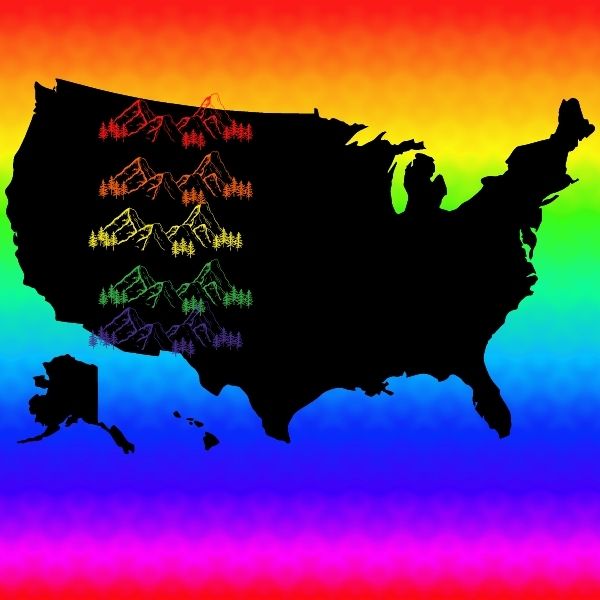Country Queers of the Mountain West
By Will Groff, Staff Writer

Editors’ Note: This is the fifth installment of our Regional Queer Country series, which has so far included the Northeast, Texas, Southeast, and Mid-Atlantic regions of the US. This week, we’ll be diving into the queer country of the Mountain West.
There’s a reason the Mountain States are sometimes affectionately called “cowboy country.” The region, which includes Colorado, New Mexico, Arizona, Nevada, Utah, Wyoming, Idaho, and Montana, is frequently featured in Western movies for obvious reasons: the terrain is harsh, the vistas are stunning and cowboy boots are pervasive. Though the region is home to major cities like Las Vegas, Phoenix, and Denver, it also includes several of the nation’s least densely populated states, where conservatism reigns and attitudes about queer people can be slow to change.
That said, the Mountain West also has a rich queer history — you just have to look for it. The first-ever gay rodeo was held in Reno, Nevada, in 1976. Nine years later, the International Gay Rodeo Association, then composed of no more than ten gay men, held its first conference in Denver. Queer country patriarch Patrick Haggerty was living in Missoula, Montana, when he came out as gay in 1969 shortly after the Stonewall riots. And then there’s My Own Private Idaho, Gus Van Sant’s classic gay hustler film, which queers the Idaho landscape to the tune of Eddy Arnold’s “Cattle Call.” Did I mention that Brokeback Mountain takes place in Wyoming?
Today, there’s a thriving queercore scene in the Phoenix area, and a surprisingly robust queer music presence in and around Denver. LGBTQ+ activists across the region are continuously fighting to have their voices heard, even as some state legislatures pass regressive and dangerous laws targeting transgender people in particular. And though parts of the region are underserved in this regard — Wyoming is one of two states that does not have a single gay bar — the Mountain States are also home to some truly vital queer spaces. (I even named my newsletter after one of them!)
Here are just a few of the country and country-adjacent artists making waves in the Mountain West:
Kitty Crimes (Denver, CO)
An irreverent mainstay of Denver’s underground music scene, Kitty Crimes is a queer multi-hyphenate: singer, rapper, producer, and performance artist. Embodying the country queer ethos aesthetically if not always sonically, Kitty Crimes sports a mullet and drives a cream-colored vintage Toyota Hilux, which their most recent EP is named after. HILUX, which they self-released in April, is a genre-bending mind trip that’s wonderfully profane and oddly touching. “I’m tired of being f*ckin’ ashamed,” they sing-rap on the charmingly blasé “super star dyke,” an obvious standout.
Sarah Slaton (Fort Collins, CO)
Sarah Slaton is a Fort Collins-based singer-songwriter, whose music marries folk songwriting with indie-pop sensibilities. Prior to launching a solo career in 2019, Slaton was the front-person of Edison, a folk trio that spent years touring with the likes of Nathaniel Ratliff, Shakey Graves, and The Revivalists. Slaton and their new backing band, the Great Perhaps, are currently gearing up for a slew of August dates in and around the Denver and Fort Collins area.
Justin Utley (Salt Lake City, Utah)
Justin Utley was raised Mormon in a suburb of Salt Lake City, where he underwent two years of conversion therapy. This experience informs his music and his mission. Equal parts entertainer and activist, Utley has used his platform to speak out against conversion therapy and give voice to other survivors. His songs, which range stylistically from twangy soft-rock to full-on pop, articulate the ever-present struggle for queer people to live their truth. His equality anthem, “Stand Up for Something,” was awarded best Country/Folk Song of the Year at the OutMusic Awards in 2011.
Claire Heywood (Denver, CO)
A poet as well as a songwriter, Dever-based artist Claire Heywood makes the kind of propulsive Americana music that plays well at festivals. Her lyrics are evocative and imagistic, which reflects both her literary background and her musical influences. These include Johnny Cash, Emmylou Harris, and Lucinda Williams, the latter of whom’s presence is especially felt on the gothic-tinged “Old Soul’s Motel.” Heywood’s new single, “Crushed Lemons,” arrives August 27.
Joy Oladokun (Casa Grande, AZ)
She’s now based in Nashville, but singer-songwriter Joy Oladokun grew up in a small town roughly halfway between Phoenix and Tucson. The daughter of Nigerian immigrants, Oladokun played guitar in her local church band and led worship for the congregation as a teenager, an experience that deeply informs her music. The self-styled “trap Tracy Chapman,” Oladokun blends elements of folk, pop, and hip-hop for thoughtful ruminations on spirituality, identity, and mental health. Her songs have appeared on Grey’s Anatomy, This is Us, and The L Word: Generation Q, and she’s attracted effusive praise from NPR, Vogue, and Billboard, among others. You can read our review of her latest album, in defense of my own happiness, here.
Bethel Steele (Fort Collins, CO)
A vital presence in the Colorado music scene, Bethel Steele has been writing and recording music for more than 13 years. Steele’s 2012 album, Of Love & Whiskey, is filled with plaintive and unpretentious country songs, while the more recent Shadows and Light gestures more toward Americana. Honored last year among our Trans Country Artists You Need to Know, Steele is also a two-time Kerrville New Folk Award finalist.
Know of anyone we missed? Tell them to sign up for our directory!
Will Groff is a freelance writer and the author of Sidewinder, a biweekly newsletter that offers an irreverent (and queer!) perspective on today’s country music.